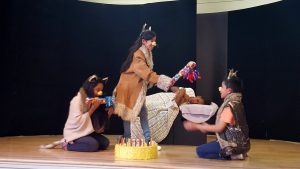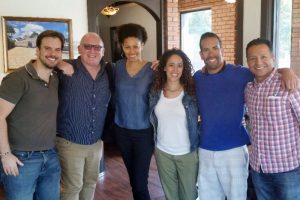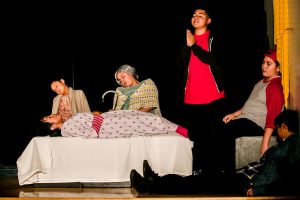BRIDGE TO SOMEWHERE
I once picked up a hitchhiker a half-mile from a state prison. It was dusk. He wore prison blues and carried a child’s backpack full of knives, cigarette lighters and Applebee’s gift cards. He didn’t smoke. He didn’t know what an Applebee’s was and could not pronounce the word. I failed to explain the concept of the gift card as a voucher for products and services. He had spent his life in institutions, his understanding as limited and brutal as his experience. He was uncomfortable out in the world and told me several times that he didn’t know why I’d picked him up; he insisted that he did not think he could be friends with someone who had never been in prison. For 250 miles I paid a great deal of attention to the smallest movements over in the passenger seat.
But as I good-lucked him at a truck stop, he pressed me with gifts and took pains to explain to me, to someone, that he understood his responsibilities: He needed a job, and would be in trouble soon if he didn’t get one. He said, sing-song, as if he had memorized the phrase metrically in a barred classroom, “All men seek for an occupation that serves all men.” He was pleased to have remembered the dictum, which sounds like it came to him via Jesus and Marx as filtered by the Department of Corrections. At work a few days later, I broke the cheap jack knife he gave me, a disposable commodity of little inherent value.
When I think of public education I think of that guy, who after fifty years’ instruction by a well-meaning society had not learned its basic methods of transaction. He had never been imparted the critical thinking skills that allow a beast to solve problems like a person. Desiring fellowship, incapable of empathy beyond his own identity, he was a typical product of institutionalized American sociopathy. Moved by pity, I helped him out into the night to walk among us, and I still wonder whether I should have backed over him at that Flying J.
One way to create fewer outcast-citizens is to teach marginalized young people to put context and order to work in their own lives, to train them to think creatively, in terms of practical value. Since 2009, teaching artists Adam Kalesperis and Joe Quintero have worked with kids through their B.R.I.D.G.E. Theatre Project (Building Relationships and Inspiring Dialogue through Global Exchange). In addition to running fifteen drama programs in southern L.A.’s Lynwood Unified School District, B.R.I.D.G.E. furthers a wider agenda of human improvement with a series of international expeditions.
 First, they taught some Los Angeles elementary school students to write plays. They performed the kids’ plays for them, then they took those plays to Ecuador and had Ecuadorian kids perform them and write their own plays, which the teachers performed. Then they took the plays from Ecuador and L.A. to Nepal and repeated the process with Nepali kids.
First, they taught some Los Angeles elementary school students to write plays. They performed the kids’ plays for them, then they took those plays to Ecuador and had Ecuadorian kids perform them and write their own plays, which the teachers performed. Then they took the plays from Ecuador and L.A. to Nepal and repeated the process with Nepali kids.
What does B.R.I.D.G.E. get out of this? For one thing, the registered nonprofit gets to show young authors videos of their own plays being performed across the globe, in different languages, by kids who don’t look or sound like them. They get to blow young minds with the immediate fact of universal fellowship, with the comfort and inspiration of knowing we’re all in bondage to the same forces, united in essential values and concerns, one race, one people, struggling to overthrow our masters and control the means of production. More or less.
This summer B.R.I.D.G.E. is taking the act to Rwanda, inspired by the Ubumuntu Arts Festival, which was created in the aftermath of genocidal conflict with the motto, “I am because you are, you are because I am: we are human together.” I read this as a rough translation of all my hitchhiker had memorized from his teachers; but art, we know, is more than empty words.
If all men do seek to serve all men, then surely B.R.I.D.G.E is right to partner with a Kigali organization called the Mashirika Performing Arts and Media Company, so that more children may be helped to tell their own stories of happiness and horror, as they interpret and express the tales of people just like them and completely different; and so that African stories can pay forward the struggles of the Asian and American stories that inspired them, when they come back across the planet to Los Angeles and then go out again to the next place.
Or not. Unlike its work in Lynwood, B.R.I.D.G.E.’s international trips are privately funded. A $20,000 GoFundMe account opened a few days ago. Donations to the Rwanda program are tax-deductible. They’re a lot safer than picking up a hitchhiker. And they’re almost certainly more useful.
photos courtesy B.R.I.D.G.E. Theatre Project
BRIDGE to Africa!
performs July 14-16, 2017
Ubumuntu Arts Festival in Kigali, Rwanda
GoFundMe page
for more info, visit B.R.I.D.G.E. on Facebook





{ 1 comment… read it below or add one }
Thank you so much for writing this fantastic piece, Jason. I’ve seen young people transform before my eyes during my years working with B.R.I.D.G.E Theatre Project. I’m excited to take all we learn from working with the youth and the adult artists in Rwanda and share that with the kids we work with back here in the states. Art is such a profound way to share the universal experience across cultures.